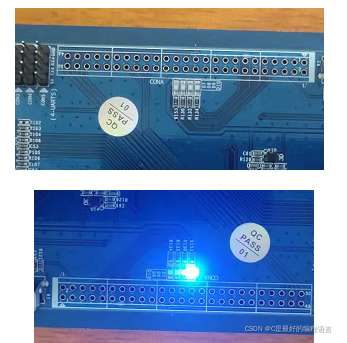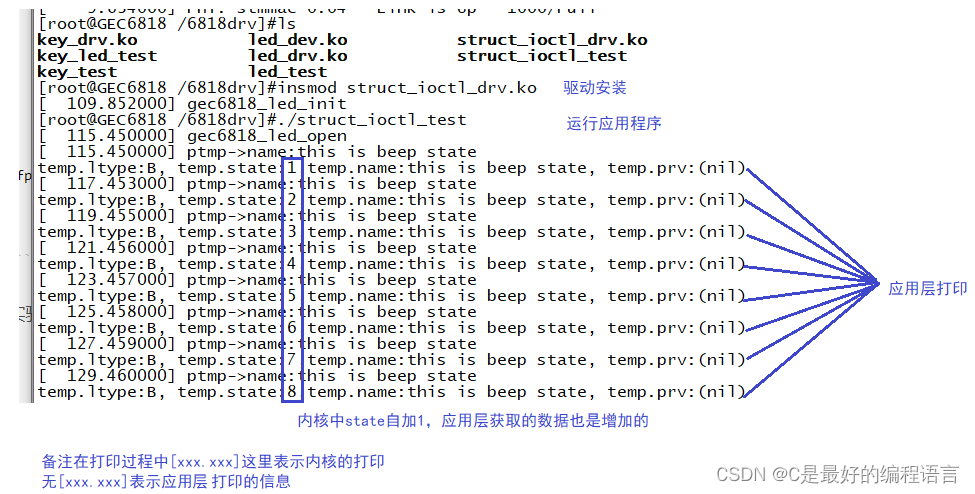一、前言
在linux的新内核中,可以根据下面文件操作集中的结构体看出,旧内核中ioctl已经被unlocked_ioctl所替代,在编写驱动时,如果驱动需要与应用传输数组或都是结构体,很多人就不知所措,下面我用两个例子来实现应用层与驱动层通过ioctl传输数据。
struct file_operations {
struct module *owner;
loff_t (*llseek) (struct file *, loff_t, int);
ssize_t (*read) (struct file *, char __user *, size_t, loff_t *);
ssize_t (*write) (struct file *, const char __user *, size_t, loff_t *);
ssize_t (*aio_read) (struct kiocb *, const struct iovec *, unsigned long, loff_t);
ssize_t (*aio_write) (struct kiocb *, const struct iovec *, unsigned long, loff_t);
int (*readdir) (struct file *, void *, filldir_t);
unsigned int (*poll) (struct file *, struct poll_table_struct *);
long (*unlocked_ioctl) (struct file *, unsigned int, unsigned long); //新内核应用层ioctl对应的驱动接口
long (*compat_ioctl) (struct file *, unsigned int, unsigned long);
int (*mmap) (struct file *, struct vm_area_struct *);
int (*open) (struct inode *, struct file *);
int (*flush) (struct file *, fl_owner_t id);
int (*release) (struct inode *, struct file *);
int (*fsync) (struct file *, loff_t, loff_t, int datasync);
int (*aio_fsync) (struct kiocb *, int datasync);
int (*fasync) (int, struct file *, int);
int (*lock) (struct file *, int, struct file_lock *);
ssize_t (*sendpage) (struct file *, struct page *, int, size_t, loff_t *, int);
unsigned long (*get_unmapped_area)(struct file *, unsigned long, unsigned long, unsigned long, unsigned long);
int (*check_flags)(int);
int (*flock) (struct file *, int, struct file_lock *);
ssize_t (*splice_write)(struct pipe_inode_info *, struct file *, loff_t *, size_t, unsigned int);
ssize_t (*splice_read)(struct file *, loff_t *, struct pipe_inode_info *, size_t, unsigned int);
int (*setlease)(struct file *, long, struct file_lock **);
long (*fallocate)(struct file *file, int mode, loff_t offset,
loff_t len);
};
二、应用层向驱动层传输结构体
2.1 应用层向驱动层传递数据并控制硬件
本次设计为应用层向驱动层传递结构体,并通过解析数据,控制开发板LED灯,设计的结构体如下:
typedef struct {
unsigned char ltype; //第几个灯
unsigned int state; //灯状态 1亮 0灭
unsigned char name[20]; //这个只是用来传输一些数据,到时可自行传输数据,在这个案例中,我也传输了些数据
unsigned int *prv; //也可以传递指针,这样一个工程基本就是传输这些了吧
}fpga_opt_t;
直接上应用层代码
#include <stdio.h>
#include <unistd.h>
#include <sys/types.h>
#include <sys/stat.h>
#include <fcntl.h>
#include <sys/ioctl.h>
typedef struct {
unsigned char ltype; //第几个灯
unsigned int state; //灯状态 1亮 0灭
unsigned char name[20];
unsigned int *prv;
}fpga_opt_t;
#define GEC6818_struct_R _IOR('S', 1, fpga_opt_t)
#define GEC6818_struct_W _IOW('S', 2, fpga_opt_t)
#define LED_FILE "/dev/gec6818_leds"
int main(void)
{
int led_fd, len;
//先对结构体进行初始化
fpga_opt_t temp = {'L', 1, "Light test", NULL};
led_fd = open(LED_FILE, O_RDWR);
if(led_fd == -1)
{
printf("open failure\n");
}
//GEC6818_struct_R 应用程序测试。
while(1)
{
//修改结构体中数据
temp.state = 1;//亮灯
sleep(2);
len = ioctl(led_fd, GEC6818_struct_R, &temp);
//修改结构体中数据
temp.state = 0;//灭灯
sleep(2);
len = ioctl(led_fd, GEC6818_struct_R, &temp);
}
close(led_fd);
}
直接上驱动代码
#include <linux/module.h>
#include <linux/init.h>
#include <linux/kernel.h>
#include <linux/cdev.h>
#include <linux/fs.h>
#include <linux/uaccess.h>
#include <linux/device.h>
#include <linux/ioport.h>
#include <linux/io.h>
#include <linux/gpio.h>
#include <cfg_type.h>
#include <linux/miscdevice.h>
#include <linux/ioctl.h>
typedef struct {
unsigned char ltype; //第几个灯
unsigned int state; //灯状态 1亮 0灭
unsigned char name[20]; //这个只是用来传输一些数据,到时可自行传输数据,在这个案例中,我也传输了些数据
unsigned int *prv; //也可以传递指针,这样一个工程基本就是传输这些了吧
}fpga_opt_t;
#define GEC6818_struct_R _IOR('S', 1, fpga_opt_t) //写数据魔幻参数
#define GEC6818_struct_W _IOW('S', 2, fpga_opt_t) //读数据魔幻参数
//定义IOCTL 魔幻参数
//这是一个命令CMD
fpga_opt_t tmp = {0};
fpga_opt_t *ptmp = &tmp;
//应用程序open,对应的驱动程序函数 gec6818_led_open
static int gec6818_led_open(struct inode *inode, struct file *file)
{
//配置为输出 ,输出低电平
gpio_direction_output(PAD_GPIO_E+13, 1);
printk("gec6818_led_open \n");
return 0;
}
static ssize_t gec6818_led_read(struct file *file, char __user *buf, size_t len, loff_t * off)
{
int klen , rt;
char kbuf[16] = "this is kernel";
rt = copy_to_user(buf, kbuf , len);
if(rt)
{
return -EINVAL;
}
printk("gec6818_led_read \n");
return 0;
}
static ssize_t gec6818_led_write(struct file *file , const char __user *buf, size_t len, loff_t * off)
{
return 0;
}
//自己写一个字符拷贝函数
int kernel_strcpy(const char *strSrc, char *strDestCopy)
{
int i, len = 0;
if ((NULL==strSrc) || (NULL==strDestCopy))
return -1;
//计算源文件长度
while(*strSrc != 0)
{
*strDestCopy = *strSrc;
strDestCopy++;
strSrc++;
}
return 0;
}
static long gec6818_led_unlocked_ioctl(struct file *filp, unsigned int cmd, unsigned long args)
{
int rt;
switch(cmd)
{
case GEC6818_struct_R:
//这里需要强制转换的类型为unsigned char * 保证数据按最小进行分割
copy_from_user((unsigned char *)ptmp,(unsigned char *)args,sizeof(fpga_opt_t));
printk("ptmp->ltype:%c, ptmp->state:%d,ptmp->name:%s, ptmp->prv:%p\n",
ptmp->ltype, ptmp->state, ptmp->name, ptmp->prv);
if(ptmp->ltype == 'L')
{
if(ptmp->state == 1) //亮灯
//点亮D7 LED
gpio_set_value(PAD_GPIO_E+13, 0);
if(ptmp->state == 0) //灭灯
//熄灭D7 LED
gpio_set_value(PAD_GPIO_E+13, 1);
}
break;
//这里
case GEC6818_struct_W:
//对结构体进行赋值
ptmp->ltype = 'B';
//改变内核结构体中的变量的值
ptmp->state++;
//自己实现拷贝函数
kernel_strcpy( "this is beep state", ptmp->name);
printk("ptmp->name:%s\n", ptmp->name);
ptmp->prv = NULL;
//将内核数据上传应用层
copy_to_user((unsigned char *)args, (unsigned char *)ptmp , sizeof (fpga_opt_t) );
break;
default:
break;
}
return rt;
}
static int gec6818_led_release (struct inode *inode, struct file *file)
{
printk("gec6818_led_release\n");
return 0;
}
//定义文件操作集
static struct file_operations gec6818_led_ops =
{
.owner = THIS_MODULE, //文件所属
.open = gec6818_led_open, //应用程序open,对应的驱动程序函数 gec6818_led_open
.read = gec6818_led_read, //应用程序write,对应的驱动程序函数 gec6818_led_write
.unlocked_ioctl=gec6818_led_unlocked_ioctl,//应用程序ioctl,对应的驱动程序函数 gec6818_led_unlocked_ioctl
.write = gec6818_led_write, //应用程序write,对应的驱动程序函数 gec6818_led_write
.release = gec6818_led_release, //应用程序close,对应的驱动程序函数 gec6818_led_release
};
//杂项设备结构体
static struct miscdevice gec6818_led_miscdev = {
.minor = MISC_DYNAMIC_MINOR, //指定了led的次设备号,可以MISC_DYNAMIC_MINOR,动态分配次设备号
.name = "gec6818_leds", //设备名称,/dev/
.fops = &gec6818_led_ops, //文件操作集
};
//模块入口初始化函数
static int __init gec6818_led_init(void)
{
struct resource *gpioes;
int rt;
//杂项设备注册
rt = misc_register(&gec6818_led_miscdev);
if (rt) {
printk("misc_register_fail\n");
goto misc_register_fail;
}
//在使用之前 先释放
gpio_free(PAD_GPIO_E+13);
//GPIO的申请
rt = gpio_request(PAD_GPIO_E+13, "gpioe13");
if(rt)
{
printk("gpio_request_fail\n");
goto gpio_request_fail;
}
printk("gec6818_led_init\n");
return 0;
gpio_request_fail:
gpio_free(PAD_GPIO_E+13);
misc_register_fail:
//混杂设备注销
misc_deregister(&gec6818_led_miscdev);
return rt;
}
//模块退出函数
static void __exit gec6818_led_exit(void)
{
gpio_free(PAD_GPIO_E+13);
//混杂设备注销
misc_deregister(&gec6818_led_miscdev);
printk("gec6818_led_exit\n");
}
//驱动程序的入口函数 insmod,则是调用module_init,执行gec6818_led_init这个函数
module_init(gec6818_led_init);
//驱动程序的入口函数 rmmod,则是调用module_exit,执行gec6818_led_exit这个函数
module_exit(gec6818_led_exit);
MODULE_AUTHOR("pqrs8889@163.com"); //作者信息
MODULE_DESCRIPTION("gec6818_led driver");//驱动描述
MODULE_LICENSE("GPL"); //内核许可证,这个必须有
2.2 实验效果
CRT打印信息

硬件显示效果,硬件的亮与灭,我觉得我不会在CSDN中搞动图,等我搞会了,再搞动图了。

三、驱动层向应用层传递结构体
3.1驱动层向应用层传递结构体
本次设计为驱动层向应用传递结构体,应用层将收到的数据进行打印出来,结构体如下,好吧,其实就是那个灯的结构体,就懒得改了,将就用哈。
typedef struct {
unsigned char ltype; //第几个灯
unsigned int state; //灯状态 1亮 0灭
unsigned char name[20]; //这个只是用来传输一些数据,到时可自行传输数据,在这个案例中,我也传输了些数据
unsigned int *prv; //也可以传递指针,这样一个工程基本就是传输这些了吧
}fpga_opt_t;
直接上应用层代码
#include <stdio.h>
#include <unistd.h>
#include <sys/types.h>
#include <sys/stat.h>
#include <fcntl.h>
#include <sys/ioctl.h>
typedef struct {
unsigned char ltype; //第几个灯
unsigned int state; //灯状态 1亮 0灭
unsigned char name[20];
unsigned int *prv;
}fpga_opt_t;
#define GEC6818_struct_R _IOR('S', 1, fpga_opt_t)
#define GEC6818_struct_W _IOW('S', 2, fpga_opt_t)
#define LED_FILE "/dev/gec6818_leds"
int main(void)
{
int led_fd, len;
//结构体清0
fpga_opt_t temp = {0};
led_fd = open(LED_FILE, O_RDWR);
if(led_fd == -1)
{
printf("open failure\n");
}
//GEC6818_struct_W 应用程序测试。
while(1)
{
//将结构体做为参数,获取驱动的值
len = ioctl(led_fd, GEC6818_struct_W, &temp);
//打印数据
printf("temp.ltype:%c, temp.state:%d,temp.name:%s, temp.prv:%p\n",
temp.ltype, temp.state, temp.name, temp.prv);
sleep(2);
}
close(led_fd);
}
这里的驱动层代码,将参考2.1中的驱动代码!这里的驱动层代码,将参考2.1中的驱动代码!这里的驱动层代码,将参考2.1中的驱动代码!
3.1 实验效果
由于这里只是获取数据,到时大家可以灵活去上传自己想要上传的数据,比如驱动温度、温度,X轴等值。这里就不搞了。
驱动中上报数据
//这里
case GEC6818_struct_W:
//对结构体进行赋值
ptmp->ltype = 'B';
//改变内核结构体中的变量的值
ptmp->state++;
//自己实现拷贝函数
kernel_strcpy( "this is beep state", ptmp->name);
printk("ptmp->name:%s\n", ptmp->name);
ptmp->prv = NULL;
//将内核数据上传应用层
copy_to_user((unsigned char *)args, (unsigned char *)ptmp , sizeof (fpga_opt_t) );
break;
实验效果及分析

